Emergent Literacy Project | Assessment
Added on 2022-09-01
21 Pages5674 Words48 Views
Bianca Sylvester 11684800 Literacy Assessment 3
EML302 Assessment Three
Student details
Name Bianca Sylvester Student Number 11684800
Course Bachelor of Education (Birth to Five)
Subject details
Subject Code EML302
Subject Name Investigation: Literacy
Subject Tutor Lisa Bayne and Cheryl Peris
Assignment details
Assessment number Assessment 3 – Emergent Literacy Project
Due Date 25/10/2019 Word Count 2000
Declaration
I certify that the attached material is my original work. No other person’s work or ideas have been
used without acknowledgement. Except where I have clearly stated that I have used some of this
material elsewhere, I have not presented this for assessment in another course or unit at this or any
other institution. I have retained a copy of this assignment. I have read and understand the Charles
Sturt University Document ‘Academic Integrity at CSU: Academic Integrity Policy.’
https://policy.csu.edu.au/view.current.php?id=00387
Name Bianca Sylvester Date 25/10/2019
Emergent Literacy Project
1
EML302 Assessment Three
Student details
Name Bianca Sylvester Student Number 11684800
Course Bachelor of Education (Birth to Five)
Subject details
Subject Code EML302
Subject Name Investigation: Literacy
Subject Tutor Lisa Bayne and Cheryl Peris
Assignment details
Assessment number Assessment 3 – Emergent Literacy Project
Due Date 25/10/2019 Word Count 2000
Declaration
I certify that the attached material is my original work. No other person’s work or ideas have been
used without acknowledgement. Except where I have clearly stated that I have used some of this
material elsewhere, I have not presented this for assessment in another course or unit at this or any
other institution. I have retained a copy of this assignment. I have read and understand the Charles
Sturt University Document ‘Academic Integrity at CSU: Academic Integrity Policy.’
https://policy.csu.edu.au/view.current.php?id=00387
Name Bianca Sylvester Date 25/10/2019
Emergent Literacy Project
1
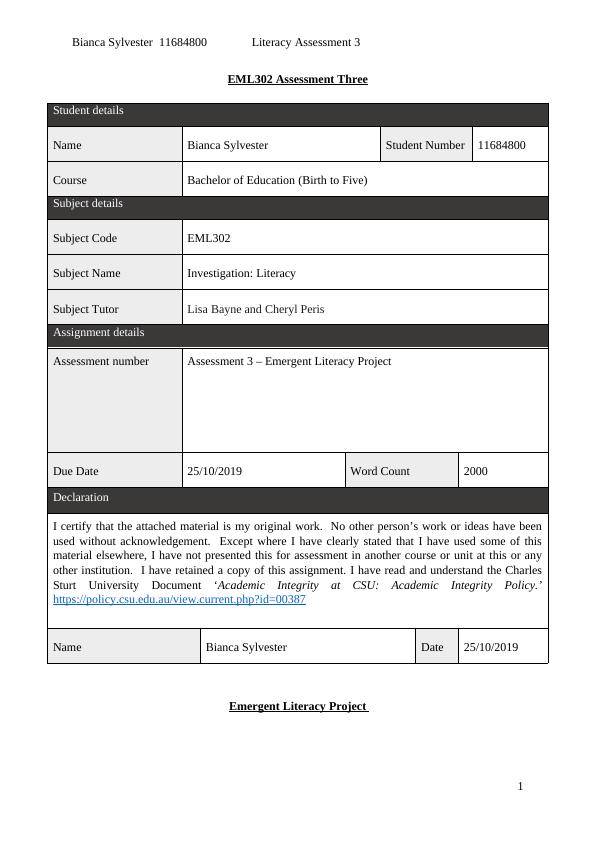
Bianca Sylvester 11684800 Literacy Assessment 3
EML302: Assessment 3 – Emergent Literacy Project
Student: Bianca Sylvester Marker: CPeris
Criterion High Distinction Distinction Credit Pass Fail
1. Well structured
and coherent report
with a tertiary
standard of writing
and referencing.
5 marks
Report begins with
an extremely well
structured, engaging
and succinct
introduction.
High level of
accuracy and control
in articulation of
ideas. Logical and
coherent text
structure. Sustained
evidence of correct
citation and
referencing.
Report begins with a
well structured and
clear introduction.
High level of
accuracy and control
in articulation of
ideas. Logical and
coherent text
structure. Consistent
approach to citation
and referencing.
Logical and
consistent structure.
Report begins with a
coherent and sound
introduction. Ideas
are clearly
articulated using
accurate sentence
structure. Text
structure is clearly
organised.
Consistent approach
to citation and
referencing with few
errors.
The report begins
with a generally
clear introduction.
Lack of clarity in
places. Text
structure may lack
clear organisation.
Minor spelling,
punctuation or
grammatical
errors. Mostly
consistent
approach to
citation and
referencing with
few errors.
3
The report is not
introduced
adequately or
introduction is not
clear. Significant
number of spelling,
punctuation or
grammatical errors
per page. Text
structure lacks
appropriate
organisation.
Inadequate citation
and referencing.
2. Discussion of
learning experiences
demonstrates:
- Knowledge and
understanding of
emergent literacy
A well synthesised
and articulated
discussion,
demonstrating: a
deep understanding
of all key emergent
literacy concepts;
exceptional
knowledge and
A thorough and
generally well
articulated
discussion,
demonstrating: a
thorough
understanding of all
key emergent
literacy concepts;
comprehensive
A generally well
articulated
discussion,
demonstrating: a
sound understanding
of most key
emergent literacy
concepts; sound
knowledge and
understanding of
A generally well
articulated
discussion,
demonstrating: a
developing
understanding of
most key
emergent literacy
concepts; basic
knowledge and
An unsatisfactory
discussion
showing: no
LIMITED
understanding of
key emergent
literacy concepts;
limited knowledge
and understanding
of supporting
2
EML302: Assessment 3 – Emergent Literacy Project
Student: Bianca Sylvester Marker: CPeris
Criterion High Distinction Distinction Credit Pass Fail
1. Well structured
and coherent report
with a tertiary
standard of writing
and referencing.
5 marks
Report begins with
an extremely well
structured, engaging
and succinct
introduction.
High level of
accuracy and control
in articulation of
ideas. Logical and
coherent text
structure. Sustained
evidence of correct
citation and
referencing.
Report begins with a
well structured and
clear introduction.
High level of
accuracy and control
in articulation of
ideas. Logical and
coherent text
structure. Consistent
approach to citation
and referencing.
Logical and
consistent structure.
Report begins with a
coherent and sound
introduction. Ideas
are clearly
articulated using
accurate sentence
structure. Text
structure is clearly
organised.
Consistent approach
to citation and
referencing with few
errors.
The report begins
with a generally
clear introduction.
Lack of clarity in
places. Text
structure may lack
clear organisation.
Minor spelling,
punctuation or
grammatical
errors. Mostly
consistent
approach to
citation and
referencing with
few errors.
3
The report is not
introduced
adequately or
introduction is not
clear. Significant
number of spelling,
punctuation or
grammatical errors
per page. Text
structure lacks
appropriate
organisation.
Inadequate citation
and referencing.
2. Discussion of
learning experiences
demonstrates:
- Knowledge and
understanding of
emergent literacy
A well synthesised
and articulated
discussion,
demonstrating: a
deep understanding
of all key emergent
literacy concepts;
exceptional
knowledge and
A thorough and
generally well
articulated
discussion,
demonstrating: a
thorough
understanding of all
key emergent
literacy concepts;
comprehensive
A generally well
articulated
discussion,
demonstrating: a
sound understanding
of most key
emergent literacy
concepts; sound
knowledge and
understanding of
A generally well
articulated
discussion,
demonstrating: a
developing
understanding of
most key
emergent literacy
concepts; basic
knowledge and
An unsatisfactory
discussion
showing: no
LIMITED
understanding of
key emergent
literacy concepts;
limited knowledge
and understanding
of supporting
2
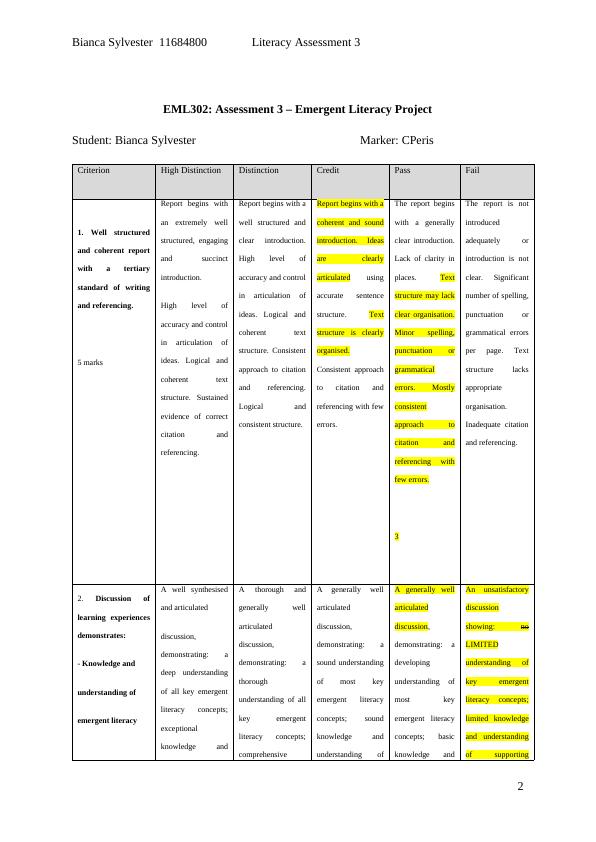
Bianca Sylvester 11684800 Literacy Assessment 3
concepts
- Ability to
effectively plan for
emergent literacy in
children
- Connections with
subject content and
evidence from
Documentation.
30 marks
understanding of
supporting
children’s emergent
literacy through
implementing a
range of appropriate
learning
experiences;
explicit, insightful,
well integrated,
perceptive and well
substantiated
connections with
relevant literature
and supporting
documentation.
knowledge and
understanding of
supporting
children’s emergent
literacy through
implementing a
range of appropriate
learning
experiences;
explicit, perceptive,
integrated and
generally well
substantiated
connections with
relevant literature
and supporting
documentation.
supporting
children’s emergent
literacy through
implementing
mostly appropriate
learning
experiences; some
explicit, perceptive
and well
substantiated
connections with
relevant literature
and supporting
documentation.
understanding of
supporting
children’s
emergent literacy
through
implementing
some appropriate
learning
experiences; some
well integrated
and substantiated
connections with
relevant literature
and supporting
documentation.
15
children’s
emergent literacy
through
implementing
some appropriate
and/or
inappropriate
learning
experiences;
tenuous
connections with
relevant literature
and supporting
documentation.
3. Effectively
evaluates the project
and articulates
implications for
future practice for
enhancing children’s
emergent literacy
development.
10 marks
Demonstrates a well
formulated
evaluation with
comprehensive
thought given to
implications for
future practice.
Demonstrates a well
formulated
evaluation with
thorough thought
given to
implications for
future practice.
Demonstrates a
generally well
formulated
evaluation with
sound thought given
to implications for
future practice.
Demonstrates an
adequately
formulated
evaluation with
basic thought
given to
implications for
future practice.
Does not
demonstrate an
adequately
formulated
evaluation and/or
unsatisfactory
thought given to
implications for
future practice.
4
Comments:
3
concepts
- Ability to
effectively plan for
emergent literacy in
children
- Connections with
subject content and
evidence from
Documentation.
30 marks
understanding of
supporting
children’s emergent
literacy through
implementing a
range of appropriate
learning
experiences;
explicit, insightful,
well integrated,
perceptive and well
substantiated
connections with
relevant literature
and supporting
documentation.
knowledge and
understanding of
supporting
children’s emergent
literacy through
implementing a
range of appropriate
learning
experiences;
explicit, perceptive,
integrated and
generally well
substantiated
connections with
relevant literature
and supporting
documentation.
supporting
children’s emergent
literacy through
implementing
mostly appropriate
learning
experiences; some
explicit, perceptive
and well
substantiated
connections with
relevant literature
and supporting
documentation.
understanding of
supporting
children’s
emergent literacy
through
implementing
some appropriate
learning
experiences; some
well integrated
and substantiated
connections with
relevant literature
and supporting
documentation.
15
children’s
emergent literacy
through
implementing
some appropriate
and/or
inappropriate
learning
experiences;
tenuous
connections with
relevant literature
and supporting
documentation.
3. Effectively
evaluates the project
and articulates
implications for
future practice for
enhancing children’s
emergent literacy
development.
10 marks
Demonstrates a well
formulated
evaluation with
comprehensive
thought given to
implications for
future practice.
Demonstrates a well
formulated
evaluation with
thorough thought
given to
implications for
future practice.
Demonstrates a
generally well
formulated
evaluation with
sound thought given
to implications for
future practice.
Demonstrates an
adequately
formulated
evaluation with
basic thought
given to
implications for
future practice.
Does not
demonstrate an
adequately
formulated
evaluation and/or
unsatisfactory
thought given to
implications for
future practice.
4
Comments:
3
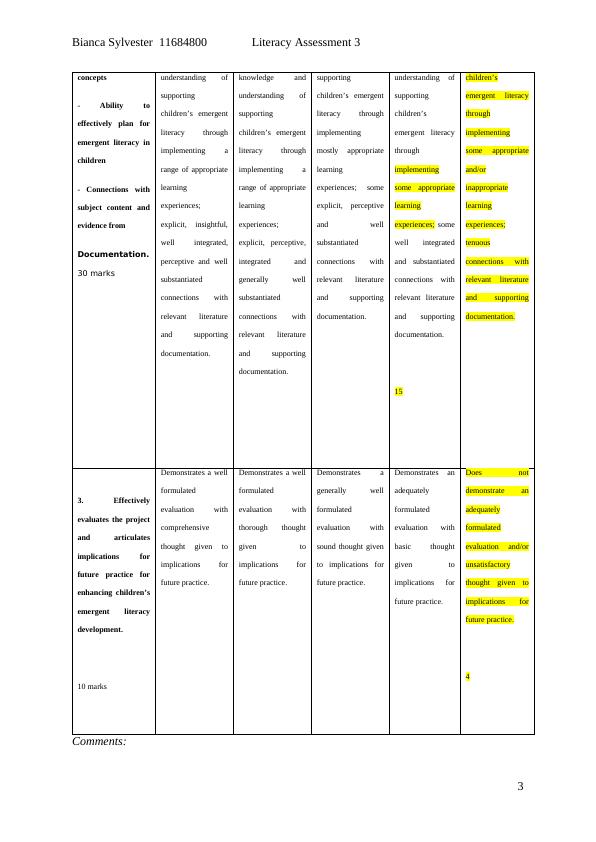
Bianca Sylvester 11684800 Literacy Assessment 3
You provide an appropriate and clear definition to specifically identify the Emergent
Literacy concepts you believe are important in for young children in your project. However
you do not successfully achieve this, as your discussion mainly focused on the general
involvement of the children rather than a predominant focus on Emergent literacy concepts
and skills.
Your focus needs to emphasis the literacy and language aspects of your experiences:
Rationale for including the experience from a literacy aspect and then Literacy concepts
which may be enhanced, Literacy skills demonstrated by the children and your role as a
teacher to promote learning.
Closer editing required to ensure minor errors do not interfere with the comprehension of
your discussion. Sub headings would assist with your organisation of this report, so check
assessment criteria.
You have supplied many examples of children’s learning with attractive documentation, so
now use these appendixes to better support your discussion, with particular examples added
from your appendixes which highlight all the EMERGENT LITERACY CONCEPTS AND
SKILLS. Reference these too. Example see Appendix One ...
You have attempted to include references from your list, however you have not successfully
supported your discussion in many instances. EYLF in particular is missing from your
discussion and is a specific assessment requirement.
You have reflected, yet these reveals you have not fully understood the purpose of this
project, to promote literacy and language throughout a play based series of experiences,
centred around children’s current interests.
Total Mark: 22/45 Grade: Fail
Early education is an important aspect of everybody's life as it forms a strong basis for future
education and psychological development. The educational development and the
4
You provide an appropriate and clear definition to specifically identify the Emergent
Literacy concepts you believe are important in for young children in your project. However
you do not successfully achieve this, as your discussion mainly focused on the general
involvement of the children rather than a predominant focus on Emergent literacy concepts
and skills.
Your focus needs to emphasis the literacy and language aspects of your experiences:
Rationale for including the experience from a literacy aspect and then Literacy concepts
which may be enhanced, Literacy skills demonstrated by the children and your role as a
teacher to promote learning.
Closer editing required to ensure minor errors do not interfere with the comprehension of
your discussion. Sub headings would assist with your organisation of this report, so check
assessment criteria.
You have supplied many examples of children’s learning with attractive documentation, so
now use these appendixes to better support your discussion, with particular examples added
from your appendixes which highlight all the EMERGENT LITERACY CONCEPTS AND
SKILLS. Reference these too. Example see Appendix One ...
You have attempted to include references from your list, however you have not successfully
supported your discussion in many instances. EYLF in particular is missing from your
discussion and is a specific assessment requirement.
You have reflected, yet these reveals you have not fully understood the purpose of this
project, to promote literacy and language throughout a play based series of experiences,
centred around children’s current interests.
Total Mark: 22/45 Grade: Fail
Early education is an important aspect of everybody's life as it forms a strong basis for future
education and psychological development. The educational development and the
4
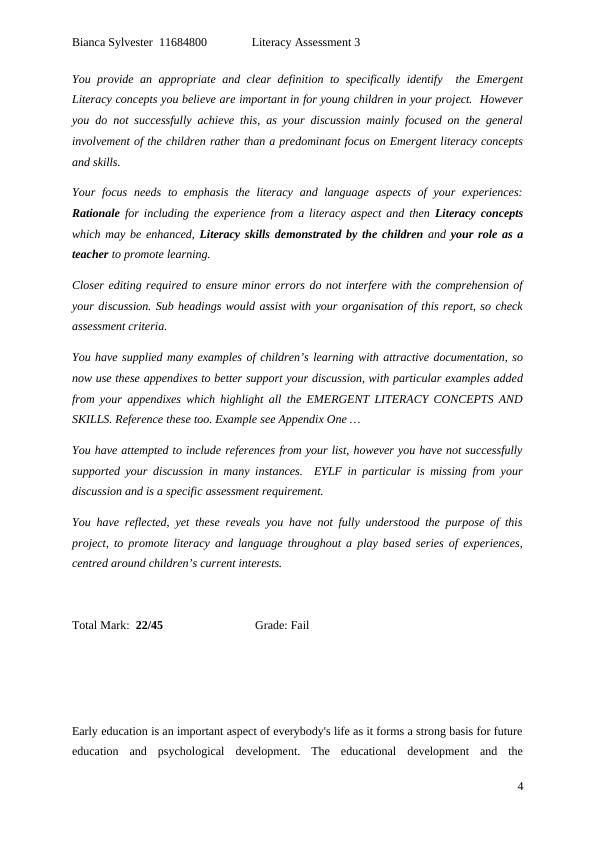
Bianca Sylvester 11684800 Literacy Assessment 3
psychological development of a child largely depend on his or her early education.
Development of cognitive skills and emergent literacy occurs mainly due to the early
education that a child receives during this period. The paper below aims to project light on
the early years learning framework of children (Cheeseman, Sumsion & Press, 2014) who are
three to four years of age and their eventual development as they go through the whole
project. It will discuss the various activities and teaching techniques to improve and develop
their skills. The paper has three learning experiences and reading of books appropriate for
them.
Introduction (300 words)
Before a child learns to read and write, they show some signs that explain the child's
understanding of words and sentences, and this is called emergent literacy. Emergent literacy
is mainly considered as a term, which helps in defining the knowledge of the reading and
writing skills of a child. The term rectifies the belief that small children below the age of 4 or
5 are in the process of literacy, and with the help of parents and teachers, children can
become literate some years down the line (BROWN, 2014). The three most important
concepts of emergent literacy include; print motivation and awareness of the print,
phonology, and vocabulary of the print, narrative skills, and letter knowledge (Rhode, 2015).
The concepts are important as the print technology helps in increasing the child’s interest
along with the involvement of reading books. The vocabulary helps the child to know and
enlarge their knowledge, which helps them to achieve academic reports. The awareness of
print media also helps in promoting the knowledge to handle a particular book. This also
helps the child to understand and learn how to differentiate letters from the words. The
narrative skills is also one of the most important concepts, which helps in describing facts and
events. Lastly, the knowledge of letters helps in differentiating and understanding the fact
that each letter varies from another letter. The report discusses about the concept of
‘multiliteracies' and my understanding of the emergent literacy project on the themes of
‘frogs'. The promotion of these particular emergent literacy skills helps creating the base of
learning to read and write. They form the building blocks, which help the children to learn
skills, attitudes and acquire knowledge to help the children to further develop their skills.
Moreover, this helps in learning ways of reading and learning normally.
5
psychological development of a child largely depend on his or her early education.
Development of cognitive skills and emergent literacy occurs mainly due to the early
education that a child receives during this period. The paper below aims to project light on
the early years learning framework of children (Cheeseman, Sumsion & Press, 2014) who are
three to four years of age and their eventual development as they go through the whole
project. It will discuss the various activities and teaching techniques to improve and develop
their skills. The paper has three learning experiences and reading of books appropriate for
them.
Introduction (300 words)
Before a child learns to read and write, they show some signs that explain the child's
understanding of words and sentences, and this is called emergent literacy. Emergent literacy
is mainly considered as a term, which helps in defining the knowledge of the reading and
writing skills of a child. The term rectifies the belief that small children below the age of 4 or
5 are in the process of literacy, and with the help of parents and teachers, children can
become literate some years down the line (BROWN, 2014). The three most important
concepts of emergent literacy include; print motivation and awareness of the print,
phonology, and vocabulary of the print, narrative skills, and letter knowledge (Rhode, 2015).
The concepts are important as the print technology helps in increasing the child’s interest
along with the involvement of reading books. The vocabulary helps the child to know and
enlarge their knowledge, which helps them to achieve academic reports. The awareness of
print media also helps in promoting the knowledge to handle a particular book. This also
helps the child to understand and learn how to differentiate letters from the words. The
narrative skills is also one of the most important concepts, which helps in describing facts and
events. Lastly, the knowledge of letters helps in differentiating and understanding the fact
that each letter varies from another letter. The report discusses about the concept of
‘multiliteracies' and my understanding of the emergent literacy project on the themes of
‘frogs'. The promotion of these particular emergent literacy skills helps creating the base of
learning to read and write. They form the building blocks, which help the children to learn
skills, attitudes and acquire knowledge to help the children to further develop their skills.
Moreover, this helps in learning ways of reading and learning normally.
5
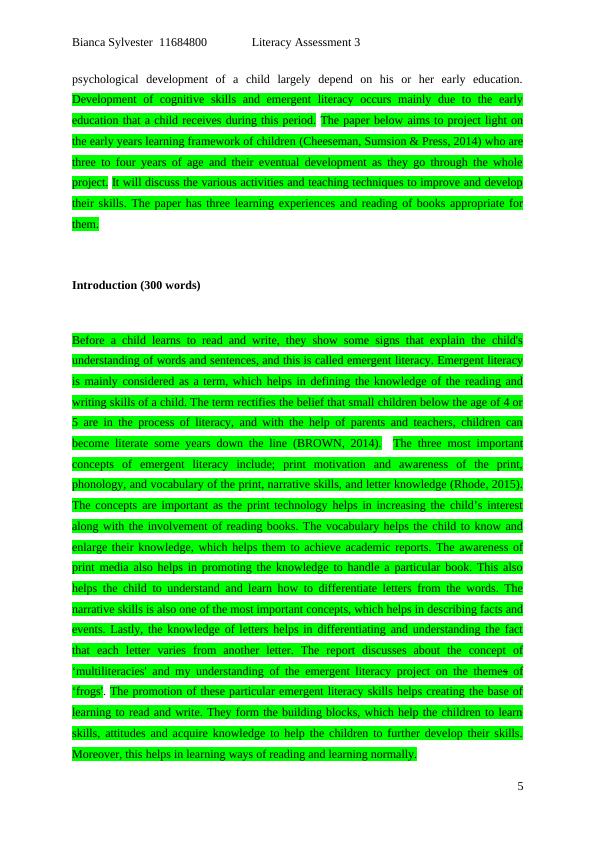
Bianca Sylvester 11684800 Literacy Assessment 3
This project began with the parents and children taking a walk and talking about the frogs,
tadpoles, and fish that they saw at the ponds in the local community. This opportunity was
extended to enhance children's learning and displayed by bringing the discovery and
investigation process and life cycles of species to the children such as eggs, tadpoles, and
fish. For the project, a children's book named ‘frog and the Wild' was used, and then, it was
linked to the ‘cycle of frog' (McNair, Day, Möller & Zapata, 2014). The project was
conducted with a group of five children called Wombats, which included three and 4-year-
olds. I found this group appropriate because they matched the language section of the
developmental milestone of the Early year learning framework (EYLF) and National Quality
Standard (NQS). This group of children talk in sentences using a variety of different words,
answering simple questions, asking different questions, telling stories, and do not shy away in
talking during conversation. After this, this process was then extended and linked to three
learning experiences that the children were interested in and were also appropriate according
to the concepts of literacy.
The project was a great success due to the children demonstrating their interests and were
inclusive throughout participation in the tasks. After reading the book, the children were
more aware and familiar with things that they would like to implement; children added
interesting answers and questions demonstrating signs of emergent literacy. Opportunities for
children like, Ana wanted to sing a song from the book, Wyatt wanted to read about frogs,
Jack read another book from the library, and Billie wanted to jump like frogs. These four
experiences open opportunities for the children to talk and enhance their literary skills and
responsive skills, which helps them to learn and improve their knowledge of literacy. The
importance of involving the children, by making them focus on learning around children’s
interests. It has been observed that listening to the children and looking into their areas of
interest, helps them in involving the children to a topic of interest and help in making better
decisions. It can also be observe that with the increase in knowledge, the children become
more involved in processing and expressing the learning ability with the help of collection of
data and building models and by making drawings.
Learning Experiences (1400 words made up of 350 each x 4)
Book – Frog and the wild world (Initial Storybook) 350 words
6
This project began with the parents and children taking a walk and talking about the frogs,
tadpoles, and fish that they saw at the ponds in the local community. This opportunity was
extended to enhance children's learning and displayed by bringing the discovery and
investigation process and life cycles of species to the children such as eggs, tadpoles, and
fish. For the project, a children's book named ‘frog and the Wild' was used, and then, it was
linked to the ‘cycle of frog' (McNair, Day, Möller & Zapata, 2014). The project was
conducted with a group of five children called Wombats, which included three and 4-year-
olds. I found this group appropriate because they matched the language section of the
developmental milestone of the Early year learning framework (EYLF) and National Quality
Standard (NQS). This group of children talk in sentences using a variety of different words,
answering simple questions, asking different questions, telling stories, and do not shy away in
talking during conversation. After this, this process was then extended and linked to three
learning experiences that the children were interested in and were also appropriate according
to the concepts of literacy.
The project was a great success due to the children demonstrating their interests and were
inclusive throughout participation in the tasks. After reading the book, the children were
more aware and familiar with things that they would like to implement; children added
interesting answers and questions demonstrating signs of emergent literacy. Opportunities for
children like, Ana wanted to sing a song from the book, Wyatt wanted to read about frogs,
Jack read another book from the library, and Billie wanted to jump like frogs. These four
experiences open opportunities for the children to talk and enhance their literary skills and
responsive skills, which helps them to learn and improve their knowledge of literacy. The
importance of involving the children, by making them focus on learning around children’s
interests. It has been observed that listening to the children and looking into their areas of
interest, helps them in involving the children to a topic of interest and help in making better
decisions. It can also be observe that with the increase in knowledge, the children become
more involved in processing and expressing the learning ability with the help of collection of
data and building models and by making drawings.
Learning Experiences (1400 words made up of 350 each x 4)
Book – Frog and the wild world (Initial Storybook) 350 words
6
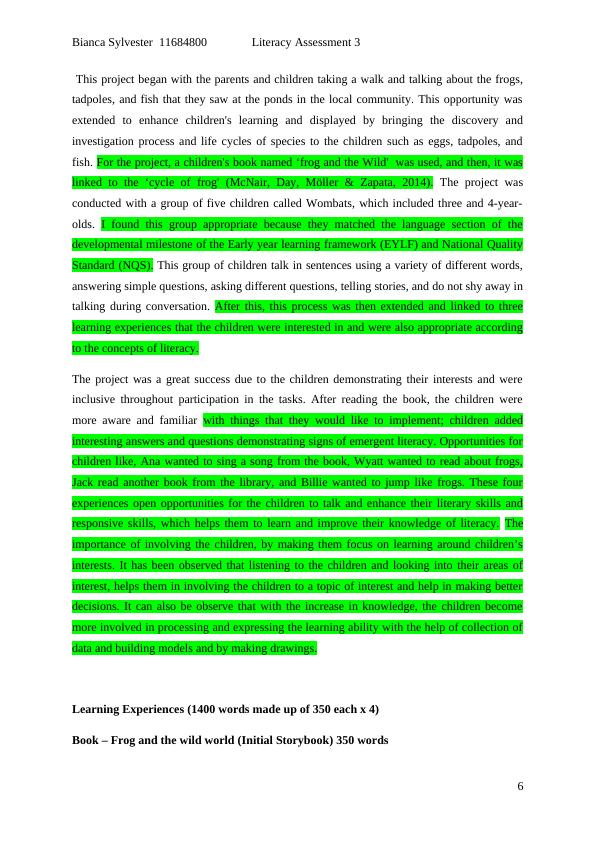
End of preview
Want to access all the pages? Upload your documents or become a member.
Related Documents
Assignment On Coherent Argumentslg...
|51
|16824
|33
(PDF) Systems development methodologieslg...
|7
|2053
|44
Assignment on The Untested Systemlg...
|8
|2064
|46
Assessment 1: Submission Document and Marking Rubriclg...
|5
|1596
|220
Assignment COMS0002 Foundations of Communicationlg...
|5
|1595
|505
ITC506 - Doing Ethics Techniques - Assignmentlg...
|6
|2373
|30
